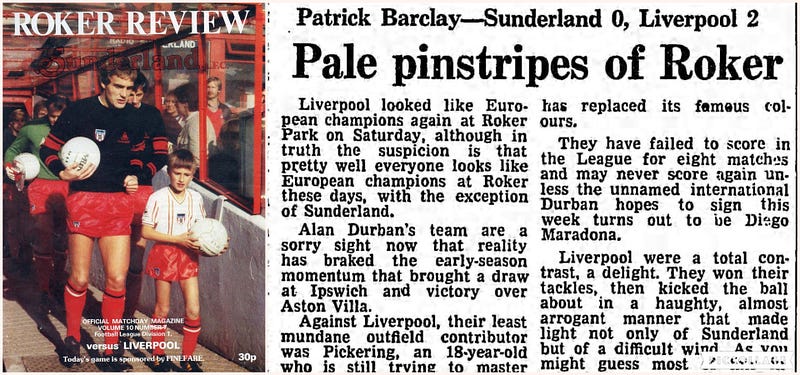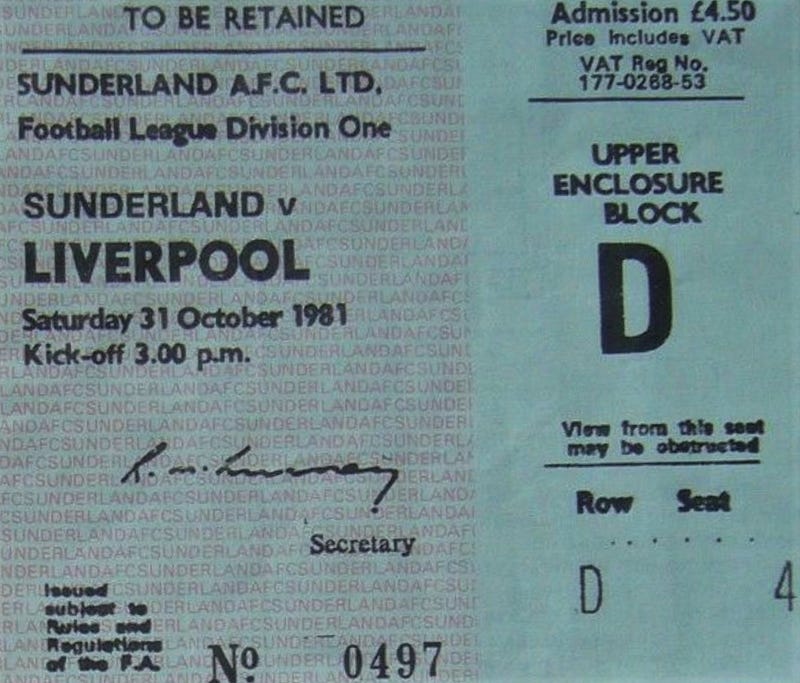The Retrospective Series Vol.10: 31st October 1981

This edition of my footballing time machine takes us to a cold if bright, crisp and clear Roker Park with 27,854 in attendance to see a Liverpool Reds in their pleasingly alternative strip of all yellow gather a much needed 3 points, their first win away from home in the then known 1st Division for 6 weeks and the 8th league game in a row whereby their hosts Sunderland failed to score. Before we re-visit the scant highlights of a rather dour and dire game, I must give thanks as always to the Liverpool fanatic who provides such a valuable resource to a long ago footballing past:
Dave Waller
This channel is about a football team - the greatest team you've ever seen. A team that played total football, won the…www.youtube.com
Although the game itself would provide very few sporting highlights of any real quality, the larger story is perhaps the future narrative yet to be written but which when considered today and four decades later, is rather, and very pun intended, striking. The hosts, currently on a run of 7 games without a goal in the league recall a young Ally McCoist to their starting XI as their Liverpudlian visitors, currently 12th in the league table and on the back of a 2–1 home defeat by Manchester United just a week before, retain a young Ian Rush in attack in place of the established “Number 9”, David Johnson. Sunderland also start the game with a future Liverpool defensive right back, Barry Venison, whilst new signing Mark Lawrenson continues his yo-yo battle with established Reds left back, Alan Kennedy. Lawrenson retains his place here before slowly and surely establishing himself as a central defensive partner to Alan Hansen (as well as being a “Mr Dependable” anywhere in the defensive line for many years and a future teammate of Barry Venison). The visitors also start with the eager raw talent of Ronnie Whelan as well as future Everton hero Kevin Sheedy on the substitutes bench.
But we return to the attacking halves of the field and whereas a future Glasgow Rangers Hall of Famer and Scottish living legend Ally McCoist struggles to make any kind of impact today, Ian Rush certainly does. He doesn’t register a goal or add to his future club record tally of 346 goals, but the future club legend (346 goals!) is central to everything that is progressive and attackingly positive for his team. The opening 4 minutes of the game sees Rush denied by a fine near post save from Sunderland goalkeeper Barry Siddall before the Sunderland keeper rushes out to force a tame lob from the Liverpool striker that ultimately drifts wide. But both are early examples of a hesitant Sunderland defence being pulled in every direction by the speed of the youngster Rush and his strike partner Kenny Dalglish should have done better but blazed over the crossbar later in the first half, and a half of football with very little in the way of quality.
The hosts grew into the game as the half wore on, with first skipper Jeff Clarke marauding forward from defence (ala Alan Hansen) before a one-two pass resulted in a snap shot easily held by Liverpool goalkeeper Bruce Grobbelaar. A dreadful kick from Grobbelaar followed, resulting in a well crafted move involving Mick Buckley and Stan Cummins that saw a Tom Ritchie goal disallowed for offside. With Mick Buckley and Nick Pickering particularly impressive, the hosts closed the half marginally on top and another scoring opportunity wasted in a goal mouth scramble following good work again from Buckley, Cummins and Pickering.

The second half would be an all yellow affair and Ian Rush in particular impressing for the visitors. Following another early goal mouth scramble and loud appeals for a penalty to start the second half, Sunderland faded from hereon in and on 61 minutes, Liverpool grabbed a deserved, if somewhat bizarre, lead. After a foul on Kenny Dalglish 10 yards or so outside of the Sunderland penalty area, the resultant free kick was initially recalled by referee Trelford Mills for no real discernible reason whatsoever and much to Liverpool’s relief as they’d tamely fluffed a pre-arranged free kick routine and Sunderland could’ve been on an attacking break away. Instead, the retaken kick was rolled to Graeme Souness and from fully 25+ yards out, his “screamer” of a shot flew into the top corner of Siddall’s goal and violently back out again.
Finally some quality football breaks out! From a swift Grobbelaar throw upfield, Liverpool cycle the ball from back to front quickly, from Phil Neal, Ray Kennedy and Ronnie Whelan through to a quick interchange between Kenny Dalglish and Ian Rush that released the Welshman to screw his shot wide when he should have scored. With Sunderland unable to escape their own half they concede a corner which Terry McDermott curls onto the head of Ronnie Whelan before Dalglish tries a brilliant overhead bicycle kick that shaves the far post of the Sunderland goal. That brilliant goal was coming, and on 77 minutes Terry McDermott supplied it. Rush and Dalglish both keep the ball alive, as well as the pressure on the Sunderland defence, before a sublime curling cross from Dalglish is met fully on the volley by Terry McDermott at the far post, and his instant shot gives Siddall no chance.
Two weeks prior, Liverpool were 2 goals clear away to Brighton when, with 13 minutes to go, they surrendered their lead and 2 precious league points. Here with 13 minutes to go and a 2 goal cushion, they should’ve scored more. Alan Hansen’s fizzing forward pass reached the instant control of Ian Rush before he released a pass into the stride of his strike partner, Kenny Dalglish. His shot was brilliantly fingertipped over the crossbar by Sunderland goalkeeper Barry Siddall and from the resultant quickly taken corner, Phil Neal’s curling cross was met by the head of Dalglish, but he tamely headed over the crossbar when he should have scored.
At the end of the month of October, 1981, Liverpool would be in 9th place in the English 1st Division after having already lost 5 of their opening 12 games and reside 9 points behind league leaders Manchester United, but with 2 games in hand. November would see progress made in the European Cup and League Cup, December a heavy loss against Brazilian side Flamengo in the World Club Cup Championship in Japan, as well as a heavy loss at home to Manchester City in the league, leaving them in 12th place in the league and 9 points behind surprise pacesetters, Swansea City.
1982 would see a remarkable turn around in their fortunes.
Thanks for reading. If you’ve enjoyed this brief footballing time machine, can I draw your attention to the three most recently published articles in this series?
Liverpool 1 Manchester United 2
The Retrospective Series Vol.9: 24th October 1981medium.com
Brighton 3 Liverpool 3
The Retrospective Series Vol.8: 17th October 1981medium.com
Liverpool 2 Swansea City 2
The Retrospective Series Vol.7: An emotional first game since the death of Bill Shankly.medium.com



